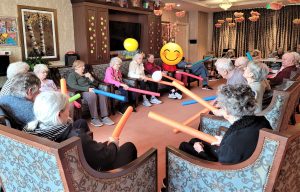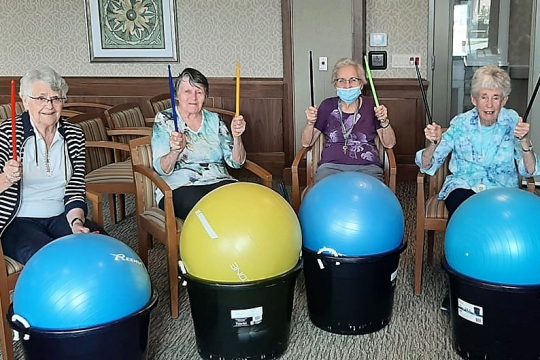
Evidence has been accumulating for quite some time. Being active is one of the most important things that older adults can do to maintain independence and improve health.
Also, the question of whether exercise is beneficial has largely been answered.
A more relevant question today is, “How do we effectively motivate adults to stay active as they age?” After all, for many of us, getting out and getting active can seem like a chore. That’s why we’ve put together these easy-to-follow tips to get you motivated.
Best Way to Motivate Seniors to Get Active in Retirement
1. Know the benefits of being active.
This advice sounds simple but can be extremely effective. There are many benefits to physical and social activities for seniors and people of all ages. Sometimes, laying them out in black and white can motivate you to get started. Here are just a few:
- Social connections
- Positive emotions
- Physical strength, mobility, and increased independence
- Cognitive vitality.
For those considering a retirement community or already living in one, another great reason to stay active is that participating in activities positively impacts the transition to senior living.
2. Find something you are passionate about.
We all find it much more enjoyable to spend time doing things we care about. So, the first step toward inspiring people to participate in activities is figure out what they enjoy or are interested in doing.
Reflecting on past interests is a great place to start. Think back to what you enjoyed doing as a child or early adulthood. Maybe you used to go biking with friends or played tennis with siblings. Knowing what you used to enjoy or be passionate about makes it easier to choose activities that would interest you today.
If you live in senior housing, the recreation professionals can help you identify interests, preferences, goals, and aspirations. They can also help you modify past activities to suit your current strengths.
3. Make activity a social event.
Older adults who spend more time interacting with a wide range of people are more likely to be physically active and have greater emotional well-being. That may be because making activity and exercise a social event provides structure and is more enjoyable.
At a retirement residence, there are many activities available to tenants. The group activities are a great way to help older adults participate in more physical activities. Once they have fun and feel a part of a community, they are more likely to keep up the momentum. The community environment also encourages friendships and helps reduce isolation, making it a great fit for seniors without family or friends living nearby.
4. Make exercise fun.
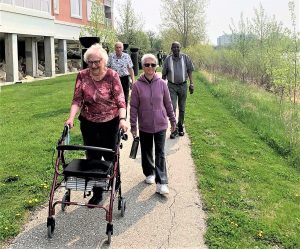 Some people like to walk on a treadmill at the gym. Others find that type of activity boring. The key to sticking with exercise is to make it interesting and enjoyable.
Some people like to walk on a treadmill at the gym. Others find that type of activity boring. The key to sticking with exercise is to make it interesting and enjoyable.
If possible, try to do all four types of exercise — endurance, strength, balance, and flexibility. The variety helps keep things interesting!
With less than one quarter engaging in regular physical activity, older adults are the least physically active of any age group. To change this statistic, it is important to make activities and exercise fun! To get creative with your exercise, try doing something that you enjoy and incorporate movement. Birdwatching is a great example of combining a hobby with walking and outdoor exercise.
If you need more ideas, read 21 Fun Ways for Older Adults to Keep Active.
5. Encourage manageable goals.
Goals are a wonderful source of motivation. Often, we make big plans and set ambitious goals. But we can feel discouraged if we don’t meet them.
By creating a plan of action – like doing five stretches, completing a small craft project – you can make a big difference in your experience of the day.
With small, achievable goals, you can cultivate feelings of confidence, a sense of purpose, and pride in accomplishment. Examples of manageable goals are things like, “Signing up for one seated yoga class tomorrow.” Or “Walk one lap around my residence floor this afternoon”. If you enjoy that activity, you can start thinking bigger and build upon your success and gradually increase intensity. beginning the intervention at a low intensity and gradually increasing the intensity over time. This gradual increase is especially important for frail older adults.
6. Celebrate small accomplishments.
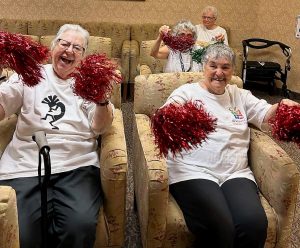 Positive reinforcement helps create motivation and confidence. Positive comments help strengthen people’s self-efficacy. Some simple ways to celebrate accomplishments are:
Positive reinforcement helps create motivation and confidence. Positive comments help strengthen people’s self-efficacy. Some simple ways to celebrate accomplishments are:
- Giving a high five
- Offering praise
- Giving a hug or a pat on the back
- Giving a thumbs up
- Clapping and cheering.
7. Find an accountability partner.
Despite our best intensions, it can sometimes feel hard to get motivated to exercise or attend an activity. That’s were activity buddies come in. Find a friend or neighbour who is willing to join so you can motivate each other.
If you live in senior housing, activity staff will often remind you about a social event or exercise class you can attend. Try buddying up with another resident, so you’re one another’s activity buddy!
Best Activities in Retirement Living
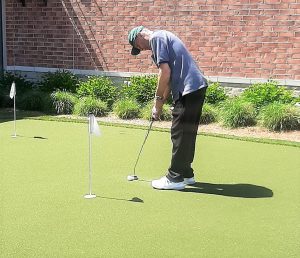 Do you know a senior that’s lacking in motivation? Maybe All Seniors Care can help. There is always something to do at our senior housing. With a minimum of 5-7 groups per day, residents can join in classes for yoga, Zumba, Tai Chi, dance and much more. Our common areas also have games that will get anyone’s heart rate up, like golf, shuffleboard, and basketball.
Do you know a senior that’s lacking in motivation? Maybe All Seniors Care can help. There is always something to do at our senior housing. With a minimum of 5-7 groups per day, residents can join in classes for yoga, Zumba, Tai Chi, dance and much more. Our common areas also have games that will get anyone’s heart rate up, like golf, shuffleboard, and basketball.
Click the links to see our options for retirement homes Hamilton mountain, assisted living in Ottawa and other senior residences across the country. You can click here to contact us for more details.
Writer – Julianna McLeod
Julianna is a health and wellness expert at All Seniors Care. Her mission is to create content that empowers seniors to form sustainable solutions for lasting health and happiness. She is an experienced writer, editor, and Recreational Therapist living in Toronto.
